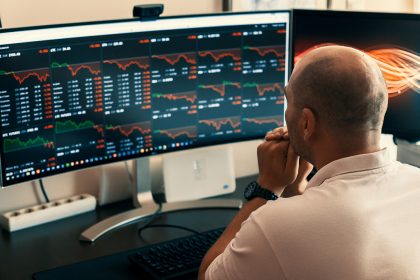Analysts point of that the lack of correlation between traditional markets and the crypto market doesn’t necessarily mean that they are inversely related.
On Thursday, October 11, Bitcoin and the overall cryptocurrency market plunged heavily wiping-off over $16 billion in short time. The Bitcoin price correction was a big surprise to investors as several analysts predicted it to surge northwards after consolidating for the last few weeks. Bitcoin price dropped by nearly 5% on Thursday with other top-ten altcoins posting a double-digit correction.
However, the surprising thing was that the cryptocurrency market correction followed the global stocks indices plummeting the previous day. On Wednesday, stock indices like Dow Jones, S&P 500 and Nasdaq entered heavy correction causing shivers in the global market. A bearish momentum swept the stock market where Nasdaq lost 4.1 percent, while Dow Jones Index dipped by 832 points in a single day. Some of the top stock which posed heavy losses include Nike, Microsoft, Visa, Apple, Boeing, Netflix, Nvidia, Adobe and Amazon.
This was the second time this year after February when crypto and stock markets corrected simultaneously. Also, Thursday’s crypto market fall was even more surprising after report about institutional money flowing in the market surfaced last week. A number of traders were confused as many expected crypto markets to surge as stocks market falls.
But yesterday’s simultaneous fall shows it clearly that there’s a lack of correlation between the two markets. To understand this, let’s have a look into the Bloomberg report from August 2018.
Lack of Correlation Doesn’t Mean Inverse Correlation
To understand this, Bloomberg interviewed Matt Hougan, the vice president of research and development at Bitwise Asset Management. Hougan noted that the fundamental drivers of traditional finance market are different from the stock market. He further emphasized that the lack of correlation between the two markets doesn’t mean an inverse correlation. Hence it would be wrong to expect the crypto market to surge when traditional markets fall.
Matt Hougan said:
“Non-correlation is not the same as inverse correlation so there’s no guarantee that when the market goes down crypto will go up. Over the long term, we think the fundamental drivers of crypto are different from the fundamental driver of equities and other assets, and we would expect the low correlation to persist.”
Another cryptocurrency analyst and trader Alex Kruger earlier said that Bitcoin breakout and demand would surge as stock market falls. However, he also noted that the correlation between stock and traditional commodities like treasuries and gold weakened last year. As a result, Kruger thinks that the fragile condition of the global market can also lead to the crypto market crash.
next“Treasuries and Gold are two assets widely used as portfolio hedges. Correlations with stocks broke down in 2018. Hence, in the event of a market crash, portfolios may suffer losses both from the stocks side and the hedge side. Forcing PMs to sell assets, accelerating a crash.”
